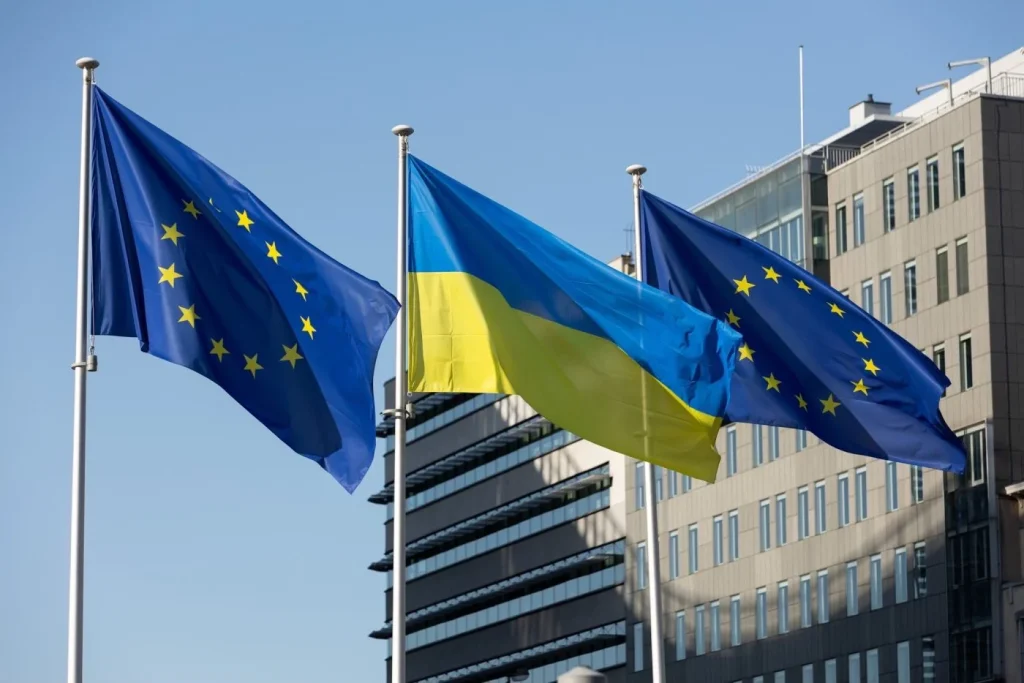On February 28, 2022, Ukrainian President Volodymyr Zelenskyy called for Ukraine’s immediate EU accession through a “new special procedure,” seizing on European Commission President Ursula von der Leyen’s statement to Euronews on February 27: “They are one of us and we want them in.”
Zelenskyy emphasized equality, stating, “Our goal is to be together with all Europeans and, most importantly, to be on an equal footing. I’m sure it’s fair. I’m sure it’s possible.”
The plea came amid Russia’s invasion, launched on February 24, which displaced over 500,000 Ukrainians and killed 352 civilians, including 14 children, per Ukrainian reports, as the country sought EU support to counter Russian aggression.
EU’s Cautious Response
EU officials quickly clarified that membership is a lengthy process, often taking years, dampening hopes for rapid accession to bolster Ukraine’s defense.
Von der Leyen’s spokesman, Eric Mamer, walked back her comments, explaining she meant Ukraine is a “European country” and part of Europe broadly, not an imminent EU member.
EU foreign policy chief Josep Borrell noted that membership could take “a lot of years,” citing the complex process requiring economic, legal, and political reforms to meet EU standards, including euro adoption readiness.
European Council President Charles Michel highlighted “different opinions and sensitivities” among the 27 member states on enlargement, with no mandate yet to negotiate with Ukraine.
Eastern European Support
Eastern European nations strongly backed Ukraine’s bid. Polish Foreign Minister Zbigniew Rau tweeted, “Today, when the Ukrainians heroically defend themselves against Russian aggression, it’s high time to welcome Ukraine into the EU community,” pledging Poland’s assistance.
A letter from the presidents of eight eastern states—Poland, Czech Republic, Estonia, Latvia, Lithuania, Slovakia, Slovenia, and Bulgaria—urged the EU to grant Ukraine candidate status and begin accession talks immediately.
Their support reflected regional fears of Russian expansion, intensified by Belarus’ February 27 referendum allowing Russian nuclear weapons, condemned by Borrell as “very dangerous.”
EU Accession Challenges
The EU, formed in 1957 as the European Economic Community with six members, expanded to 27 after Brexit in 2020. Current candidates—Turkey, Serbia, North Macedonia, Montenegro, and Albania—face prolonged delays due to rigorous requirements, with Croatia’s 2013 accession taking nearly a decade.
Ukraine’s 2014 Association Agreement with the EU, deepening economic and political ties, provides a foundation, but its GDP per capita of $3,700 in 2021, compared to the EU average of $38,000, underscores the economic reforms needed.
Corruption and judicial weaknesses, highlighted in EU reports, further complicate Ukraine’s path, despite its 2022 candidate status granted in June after intense lobbying.
Global and Regional Context
Ukraine’s bid unfolded amid global crises, including Russia’s nuclear alert, SWIFT sanctions, and discrimination against African students at the Ukraine-Poland border.
The IPCC’s February 2022 climate report warned of impacts on 3.6 billion people, while Myanmar’s refugee crisis saw 20,000 Chin fleeing to India. Posts on X in 2022 praised Eastern Europe’s solidarity, with some urging faster EU action for Ukraine.
By 2025, Ukraine’s EU talks progressed slowly, with Hungary and Slovakia citing concerns over minority rights and energy dependencies.
The invasion, costing Russia a 30% ruble collapse, underscored the urgency of Ukraine’s integration to counter Russian influence, yet the EU’s cautious approach reflected internal divisions and procedural realities.






